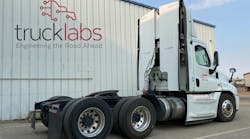Fleet sustainability technology company TruckLabs finalized another fundraising round that will help it increase the production of its TruckWings product. This tractor-mounted, smart aerodynamic device automatically closes the gap between the cab and the trailer to reduce drag, improve stability, and increase fuel efficiency.
TruckLabs fleet customers have recorded more than 600 million over-the-road miles as the company revenue has grown over the past year, chief executive Daniel Burrows told FleetOwner. TruckWings has helped fleets find 3-6% in fuel savings, accounting for more than 85 million lbs. of CO2 emissions.
Burrows said he expects his company’s revenue to “triple” this year to more than $10 million. The Series B fundraising round, led by Blue Bear Capital, would help TruckLabs quadruple production this year, Burrows said.
See also: How aerodynamics can extend Class 8 EV range
“It’s all about getting more of these out on the road, getting to our customers earlier,” he explained. “We’ve got a long wait time right now. We’re trying to do the operational work to build efficiencies in our production to get more of the units out.”
TruckLabs was founded in 2014 to find intelligent efficiencies for fleets to reduce emissions and improve fleet operations. Burrows said the TruckWings technology is on “thousands” of tractors hauling for major national fleets, such as Transervice Logistics (No. 272 on the 2023 FleetOwner 500: For-Hire list). Burrows said his small sales staff has focused on larger carriers but wants smaller fleet customers too.
How fleets can take small steps toward sustainability
"We are proud to partner with TruckLabs in their mission to drive sustainability in the trucking industry," said Mark Pusak, AVP at Transervice. "As part of our customers' commitment to reducing energy usage and expanding renewable energy initiatives, we recognize the importance of innovative solutions like TruckWings in reducing our carbon footprint for our fleets."
Burrows said that fleet customers can be overwhelmed by the push for decarbonization. And while some sustainability technology focuses on specific fuel types, TruckLabs is agnostic.
“We don’t have any dog in that race—but what we certainly hear from fleets is that it’s a big choice to make,” he said. “What we can do is help you improve your diesel trucks today and also enable a switch to alternative fuel in the future when they’re here. So if you want to make progress on your 2023 sustainability goals, we can actually put TruckWings out there to impact your carbon today using the same drivers, the same trucks. It’s a very low capex, which pays for itself within 18 months or so.”
To show how the technology improves efficiency, TruckLabs offers trials to potential customers, including putting TruckWings on some fleet tractors to compare to others without them. The results are tracked through the TruckLabs telematics dashboard.
“They see the fuel savings, they see when the TruckWings are open, when they're shut, if a driver had an issue, they can see that we flag everything that has any problems,” Burrows explained. “At the end of that trial, they have feedback from drivers, feedback from technicians, and a full business case based on their trucks, their mileage, their fuel savings, and what it would do their operations.”
The TruckLabs CEO said fleet sustainability involves big and small decisions that lead to needed experience for future decisions. “Trying things in a contained way where you understand exactly what you’re getting is really important,” he said.
He shared the example of testing out battery-electric trucks before proper charging infrastructure is installed. “You can charge that electric truck off diesel generators, which is not going to do great things for the environment,” Burrows said. “That’s probably net worse for the environment. But the goal is not to improve the emissions of one truck or a couple of trucks. The goal is to see if you can use these electric trucks in your facility. Can you run routes with them? Will they work for the drivers?
“In running a smaller pilot, you can get the data and real-world experience to prepare to go bigger once you’re really confident,” he continued. “I really believe in piloting things and testing things—both big and small—because these are complicated new technologies and there are a lot of unexpected second-order effects, such as resale value and technician training.”




